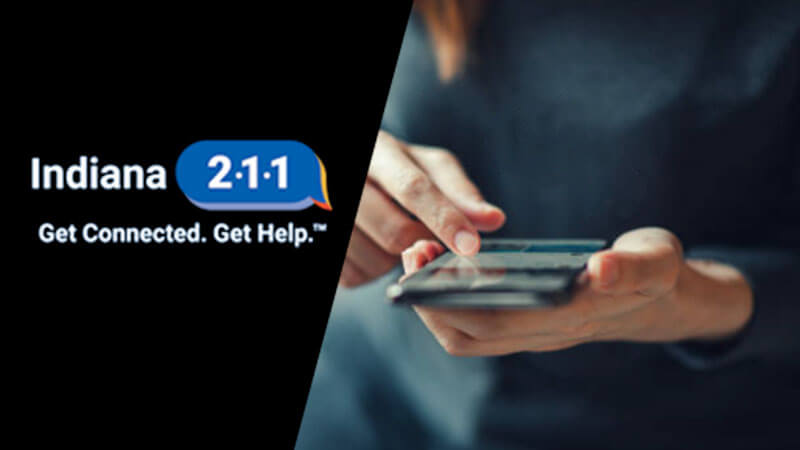Nationally recognized Purdue software helping Indiana residents by teaming with Indiana 211

WEST LAFAYETTE, Ind. – A nationally recognized software created at Purdue University is now helping case managers in primary care and other settings connect Indiana residents with critically needed social services.
The software, called Bridges, is linked to Indiana 211, a division of the state’s Family and Social Services Administration. Indiana 211 is a free phone and internet service that connects Indiana residents with help and answers from thousands of health and human service agencies and resources in their local communities. It uses statistical data to inform decision-makers and governments across the state about current and trending social needs.
The complementary social-assistance missions of the Purdue software and Indiana 211 not only help people with basic needs like food, housing and transportation, but also contribute to overall health. This is because these factors, known as social determinants of health, have a much greater effect on people’s health than medical care factors. In fact, the U.S. Centers for Disease Control and Prevention says socioeconomic factors account for 80% of a person’s health while medical care accounts for the remaining 20%.
Bridges — which has been adopted or considered for use by at least one county health department in Indiana, a group of law enforcement social workers, and a physical therapy program — continues to be developed by a team within Purdue’s Regenstrief Center for Healthcare Engineering. The software was initially developed for a federal Health Resources and Services Administration competition in 2023. It placed second in a field of 134 competitors, demonstrating that it improves care coordination among health centers and social service organizations — a key goal in the HRSA’s objective to improve health nationwide.
The HRSA said Purdue’s software “streamlined the screening and social-service referral process” by:
- Prompting better questions for needs assessments.
- Providing cohesive referral instructions.
- Offering follow-up reminders for case managers.
- Closing the loop on social service referrals and outcomes.
Purdue faculty who developed the winning software are Nicole Adams, clinical associate professor of nursing; Nan Kong, professor of biomedical engineering; and Baijian Yang, professor of computer technology.
According to Adams, the software succeeds in helping primary-care case managers find and refer patients who need social services, but — perhaps just as important — allows case managers to set follow-up reminders to check in with their clients to find out if the service was accessible and helpful.
“Our software system also tracks where they’ve been referred and if they get the service they need,” Adams said. “Once we have enough data collected, we can use machine learning to continually improve the recommendations of services for individual clients. Using all that data, the system will continually learn which services should be assigned first to get the biggest improvements and best health outcomes.”
Indiana 211 director Tara Morse said she recognizes the importance of this partnership and the integration of the Indiana 211 resource database with the Bridges software. Health care providers who use Bridges will not only be able to provide current resources from the 211-resource database, but also connect patients to other resources that may provide a positive impact to their overall health.
“The Bridges project is truly an extension of Indiana 211, supporting its mission of improving the quality of life for all Indiana residents,” Morse said. “We promote equity, and we connect the people of Indiana to health and human service resources through highly skilled navigators, continuous community collaboration and a robust community database and technological innovations. Indiana 211 aims to be the ‘source of truth’ by providing the most accurate resources possible. The Bridges project provides additional access to these resources.”
The collaboration with Indiana 211 also benefits health care providers.
“When clinics initially set up Bridges, they will be able to pull in all of the social service agency information from 211 and not have to manually enter it,” Adams said. “Also, we will be pushing data (without private personal information) back to 211 from the clinics. That data includes new organizations or other service-related changes. This gives 211 an army of Bridges health care users across the state, constantly giving them a stream of updates on resources from the boots on the ground.”
In addition to using its $100,000 prize from the HRSA competition for the 211 collaboration, Adams said the Bridges software team intends to expand is reach nationally by providing critical information that’s unattainable today.
“If I want to look at how social determinants of health influence the outcomes of people with diabetes, I can’t find data to do that analysis,” Adams said. “Bridges will first gather this kind of data throughout Indiana and then expand nationally. The software gives us the potential to create the first national-level, unique data set on social determinants of health.”
The Purdue researchers disclosed the software to the Purdue Innovates Office of Technology Commercialization, which has registered a copyright on it. To license the software, contact Matt Halladay, senior business development manager and licensing manager – physical sciences, mrhalladay@prf.org, about 2023-ADAM-70129.
About Purdue University
Purdue University is a public research institution demonstrating excellence at scale. Ranked among top 10 public universities and with two colleges in the top four in the United States, Purdue discovers and disseminates knowledge with a quality and at a scale second to none. More than 105,000 students study at Purdue across modalities and locations, including nearly 50,000 in person on the West Lafayette campus. Committed to affordability and accessibility, Purdue’s main campus has frozen tuition 13 years in a row. See how Purdue never stops in the persistent pursuit of the next giant leap — including its first comprehensive urban campus in Indianapolis, the new Mitchell E. Daniels, Jr. School of Business, and Purdue Computes — at https://www.purdue.edu/president/strategic-initiatives.
Writer/Media contact: Amy Raley, araley@purdue.edu
Sources: Nicole Adams, adams417@purdue.edu; Tara Morse, Tara.Morse@fssa.IN.gov